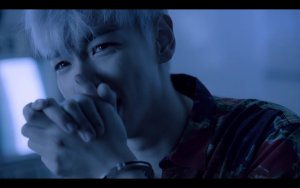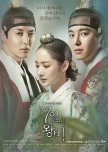Queen for Seven Days was a dissatisfying viewing experience. As a lover of sageuk dramas and Korean history in general, I looked up the real-life events surrounding this drama's plot before watching it. I knew the show would take liberties with history, as dramas always do, but I felt that this drama did so to its detriment. I will center this review around the three main characters as I feel that a discussion of them is the best way to explain what went wrong in this drama.
Shin Chae Kyung: As with many many other female leads in dramaland Chae Kyung has the unfortunate trait of being too pure and good for this world. She has literally never done a single thing wrong in her entire life. When she messes up or makes mistakes it's always a result of other people's manipulation, a lack of information, or just bad luck. Whether a child or adult she has that ever-present innocence about her that draws every man within a hundred miles to her side. She is in short a Mary-Sue and a particularly boring one at that. Aside from her kindness and good-hearted nature she has very little to recommend her to the audience. She is stagnant as a character from childhood to adulthood. The fact that both male leads fall for her when she was little more than a child only further emphasizes her lack of personal growth because they find her largely unchanged as an adult. Many may claim she undergoes character growth towards the end of the drama following the prince's ascension to the throne but even then she is simply acting selflessly and with kindness as she always has. The only real difference is that she has narrowed the scope of her kindness to her husband alone instead of the much wider range of people she cared about previously. Chae Kyung is above all a boring character. She does not offer any relatability to the viewer and because of that, the audience is left feeling little connection to her or her emotions and struggles.
Yi Yoong (King Yeon Sang Un): The famous crazy deposed king of Joseon. Of the three main characters, I feel that Yoong was the best written and most fleshed-out of the three. His mental decline was convincing and slow-building. His motivations mostly clear and though illogical from the viewer's perspective were clearly explained from his point of view so that one could see how he came to such conclusions and decisions. His inner turmoil surrounding his brother and father was also, I felt, the most historically accurate part of the show. His obsession with Chae Kyung, however, made little sense. He clearly did not want to marry her, as he could have easily done so multiple times throughout the drama and chose not to, but he also did not want her to marry his brother. His feelings for her seemed oddly sexual at times while also being fairly paternalistic or brotherly. It was very creepy and off-putting at times especially when she is younger. His relationship with her also makes no sense from a historical standpoint as it would have been seen as risky and highly improper by all involved which directly conflicts with Chae Kyung's sense of propriety and Yoong's obsession with his self-image. In the latter half of the drama as Yoong's mental state deteriorates his obsession with her reaches a fever pitch that defies all logic or sense. Unlike some of his other illogical actions, such as those surrounding how he deals with his ministers or brother, the show does not even give this obsession the benefit of making sense to Yoong. It almost seemed like a hole within the character's personality and though he was crazy, it was still too outlandish to make sense to anyone including him.
Yi Yeok (Prince JinSeong): I had the most problems with Yeok. His main character trait seemed to be inconsistency and undecidedness. This man could not make a decision to save his life, at times literally. He vacillates between his feelings for his brother, Chae Kyung, his friends, his organization, his secret identity, his mother, etc. Each time he changes his opinion or makes a choice he inevitably goes back on it. It was exhausting and completely unnecessary most of the time. For example, why spend so much time wondering if he can trust his clearly untrustworthy brother? Why decide to marry Chae Kyung and then spend upwards of two full episodes bemoaning that same decision which no one forced him into? Why form a secret organization and identity only to mostly ignore it in favor of court intrigue and then ignore the court intrigue in favor of the organization? None of it made sense. 90% of the conflict in this drama could have been solved had Yeok been able to stick with a decision. His secret organization was also a sticking point for me. It is historically nonexistent. The plotline surrounding it was superfluous. It added nothing to the plot and was a waste of time. Why was this created for this drama? I understand that the writers wanted Yeok to seem more manly and strong than his real-life counterpart but creating a vigilante group was not the way to achieve this goal. Chae Kyung deserved better than this man and 100% of her suffering can be placed at his feet.
Overall the characters of this show were underdeveloped and the plot possessed a lot of time-wasting fluff. It was still an entertaining show but I wish they had simply given us a more historically accurate retelling of the events surrounding the deposition.
Shin Chae Kyung: As with many many other female leads in dramaland Chae Kyung has the unfortunate trait of being too pure and good for this world. She has literally never done a single thing wrong in her entire life. When she messes up or makes mistakes it's always a result of other people's manipulation, a lack of information, or just bad luck. Whether a child or adult she has that ever-present innocence about her that draws every man within a hundred miles to her side. She is in short a Mary-Sue and a particularly boring one at that. Aside from her kindness and good-hearted nature she has very little to recommend her to the audience. She is stagnant as a character from childhood to adulthood. The fact that both male leads fall for her when she was little more than a child only further emphasizes her lack of personal growth because they find her largely unchanged as an adult. Many may claim she undergoes character growth towards the end of the drama following the prince's ascension to the throne but even then she is simply acting selflessly and with kindness as she always has. The only real difference is that she has narrowed the scope of her kindness to her husband alone instead of the much wider range of people she cared about previously. Chae Kyung is above all a boring character. She does not offer any relatability to the viewer and because of that, the audience is left feeling little connection to her or her emotions and struggles.
Yi Yoong (King Yeon Sang Un): The famous crazy deposed king of Joseon. Of the three main characters, I feel that Yoong was the best written and most fleshed-out of the three. His mental decline was convincing and slow-building. His motivations mostly clear and though illogical from the viewer's perspective were clearly explained from his point of view so that one could see how he came to such conclusions and decisions. His inner turmoil surrounding his brother and father was also, I felt, the most historically accurate part of the show. His obsession with Chae Kyung, however, made little sense. He clearly did not want to marry her, as he could have easily done so multiple times throughout the drama and chose not to, but he also did not want her to marry his brother. His feelings for her seemed oddly sexual at times while also being fairly paternalistic or brotherly. It was very creepy and off-putting at times especially when she is younger. His relationship with her also makes no sense from a historical standpoint as it would have been seen as risky and highly improper by all involved which directly conflicts with Chae Kyung's sense of propriety and Yoong's obsession with his self-image. In the latter half of the drama as Yoong's mental state deteriorates his obsession with her reaches a fever pitch that defies all logic or sense. Unlike some of his other illogical actions, such as those surrounding how he deals with his ministers or brother, the show does not even give this obsession the benefit of making sense to Yoong. It almost seemed like a hole within the character's personality and though he was crazy, it was still too outlandish to make sense to anyone including him.
Yi Yeok (Prince JinSeong): I had the most problems with Yeok. His main character trait seemed to be inconsistency and undecidedness. This man could not make a decision to save his life, at times literally. He vacillates between his feelings for his brother, Chae Kyung, his friends, his organization, his secret identity, his mother, etc. Each time he changes his opinion or makes a choice he inevitably goes back on it. It was exhausting and completely unnecessary most of the time. For example, why spend so much time wondering if he can trust his clearly untrustworthy brother? Why decide to marry Chae Kyung and then spend upwards of two full episodes bemoaning that same decision which no one forced him into? Why form a secret organization and identity only to mostly ignore it in favor of court intrigue and then ignore the court intrigue in favor of the organization? None of it made sense. 90% of the conflict in this drama could have been solved had Yeok been able to stick with a decision. His secret organization was also a sticking point for me. It is historically nonexistent. The plotline surrounding it was superfluous. It added nothing to the plot and was a waste of time. Why was this created for this drama? I understand that the writers wanted Yeok to seem more manly and strong than his real-life counterpart but creating a vigilante group was not the way to achieve this goal. Chae Kyung deserved better than this man and 100% of her suffering can be placed at his feet.
Overall the characters of this show were underdeveloped and the plot possessed a lot of time-wasting fluff. It was still an entertaining show but I wish they had simply given us a more historically accurate retelling of the events surrounding the deposition.
Cet avis était-il utile?

















